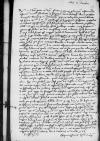Acris profecto obiurgatio ⌊dominae⌋ in immerentem, quae me vehementer perturbaret, nisi scirem Reverendissimam Dominationem Vestram iam occalluisse ad huiusmodi fulgetra, quae plus ex aviditate expostulandi apud fidentem, quam ab superinscribed⌈abab superinscribed⌉ animo exulcerato profecta videntur. Magis me conturbat istarum procellarum auctor, cuius perpetuum apparet esse studium, ut ⌊domini consiliarii⌋ male audiant apud ⌊principes⌋ et ut s nihil sinat esse integrum, quod illi decreverunt. Quod ad rem ipsam attinet, ego non video modum, quo redintegr superinscribed⌈rr superinscribed⌉ari queat, quod iam suo loco motum est, maxime sub hac contentione, quam pro tuenda fide regia susceptam videri volunt, qui sunt auctores. Proinde in diversum nitendo vereor, ne nos ipsos superinscribed in place of crossed-out a⌈a ipsos ipsos superinscribed in place of crossed-out a⌉, praesertim autem Reverendissimam Dominationem Vestram, maiori obiciamus criminationi et odio omnemque ludamus operam, cum tanti res non sit, pro qua hoc obeamus discrimen. Unum hoc omitti, meo iudicio, non debet, ut videlicet omnes ⌊domini consiliarii⌋ causam Reverendissimae Dominationis Vestrae tueantur ipsamque Dominationem Vestram levent hoc criminationis probro, maxime domini palatini una mecum. De qua re aliquid nunc domino ⌊palatino Marieburgensi⌋ scribam, verum nihil certi constitui prius potest, quam sciamus, quid ad dominos palatinos de collectione accisae ⌊maiestas regia⌋ nunc scripserit, quod ego et dominis ⌊Culmensi⌋ et Marieburgensi palatinis nunc resciscam, nam ad me regia maiestas aliud nihil scripsit, quam ut colligendi denarii Sancti Petri curam haberem. Deinde Vestrae quoque Reverendissimae Dominationis consilio utemur, quem in modum res sit instituenda, quod mihi privatim antea aedi, non erit ab re. Haec cum scriberem, ecce adest puer domini ⌊Costka⌋ cum litteris et generali illo mandato ⌊regiae maiestatis⌋. In respondendo conformabo me Reverendissimae Dominationi Vestrae ac festinabo, ut domini palatini accipiant litteras regias, quas mihi misit Reverendissima Dominatio Vestra. Quam rogo, ne frangatur hac tempestate, qualis fere incidere solet in eos, quorum est in republica prima auctoritas, quae stabit volente Deo d... illegible⌈...... illegible⌉ et algebit
cf. Suet. Tib. 61.2.8 Nemini delatorum fides abrogata ⌊delatorum fidescf. Suet. Tib. 61.2.8 Nemini delatorum fides abrogata ⌋
. Remitto litteras omnes ad Reverendissimam Dominationem Vestram datas cum novitatibus, pro quibus ago gratias. Addidi ad me quoque datas a dominis ⌊Hosio⌋ et ⌊Nibschicio⌋, cuius mentem forte aulica stropha tecta declarare mihi non gravetur Reverendissima Dominatio Vestra, quae illum non secus atque on the margin in place of crossed-out ut⌈ut non secus atque non secus atque on the margin in place of crossed-out ut⌉ seipsam novit. ⌊Hosio⌋ quid respondendum sit, ignoro, cognitum non habens, quid nunc agat dominus ⌊Alexander⌋, quem non credo passurum, ut ⌊nepos⌋ suus cedat iuri, etiam si liti et causae cesserit.
Legi ⌊Renecii⌋ ⌊⌋ altercantia, quibus id quidem effectum est, ut antigonista(!) ⌊ille⌋ in magna laude g ducet se ausum cum episcopo manum conserere. Ceterum quid lucri fecerit Reverendissima Dominatio Vestra non video, etiam si eius nihil est, meo quidem sensu, quod reprehendi possit. Equidem, si ante fuissem in consilium adhibitus, suasissem potius eludi lacessentem.
Commendo me Reverendissimae Dominationi Vestrae, quam in mei amore Dominus servet diu integram et felicem.


 BCz, 1597, p. 320
BCz, 1597, p. 320